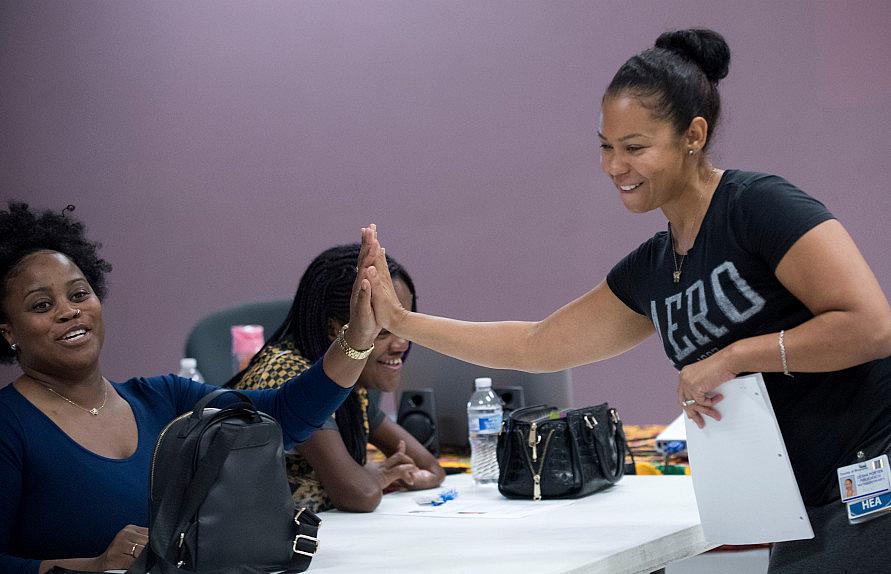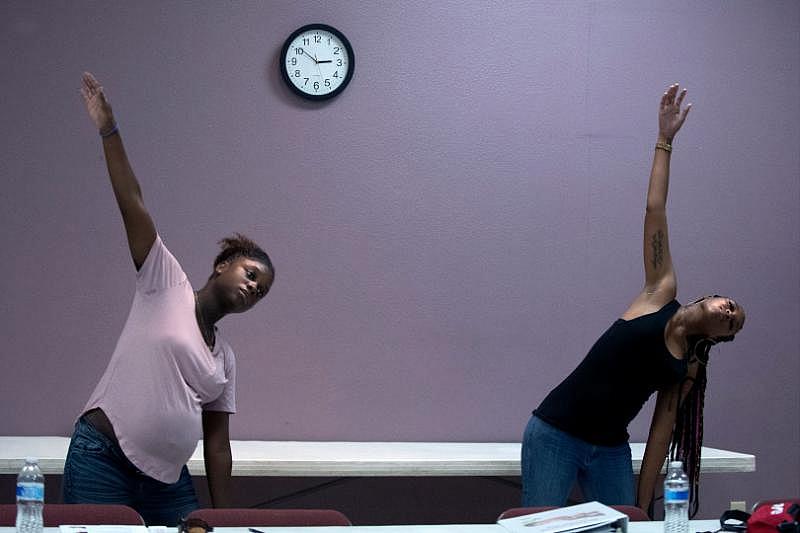Can racism play a role in infant mortality? Riverside County helps black mothers find support, community
This article was produced as a project for the USC Center for Health Journalism’s 2018 California Fellowship.

Black Infant Health program leader, Lesha Porter, right, gives a high five to Juanita O’Neal of Perris at Living Way Community Church in Moreno Valley on Wednesday, Oct. 17, 2018. The program is the state’s response to addressing black infant mortality disparities across California.
(Photo Credit: Cindy Yamanaka, The Press-Enterprise/SCNG)
One by one, about a dozen pregnant black women spoke of the subtle hints of racism they’ve experienced at home, in the workplace, and in public.
They talked about being scolded for wearing natural hair at work, settling for less desirable housing because of their incomes, and internalizing unrealistic beauty standards that can often pit light-and-dark-skinned black women against one another.
The women gathered at Living Way Community Church in Moreno Valley to talk about their pregnancies, give each other stress-management tips, and simply keep each other company.
They’re participants in Riverside County’s Black Infant Health program — a free state-funded service for black women that involves group meetings and individual case management. About 30 women are currently participating in the Riverside program, with about 130 women who go through it annually.
The nearly 30-year-old Black Infant Health program is the state of California’s response to address the gaps in infant mortality deaths that continue to disproportionately affect the black community.
Years ago, Black Infant Health programs primarily focused on getting individual black women into prenatal care. Now, state health officials are focusing on a more group-based and holistic approach exploring how racism, not race, can contribute to the early death of black infants.
Dankia Williams, 30, left, and Jazmine Davis, 25, stretch after meditation during a Black Infant Health program held at Living Way Community Church in Moreno Valley on Wednesday, Oct. 17, 2018. Both live in Corona. (Photo Credit: Cindy Yamanaka, The Press-Enterprise/SCNG)
Monica McLemore, a nurse and professor at UC San Francisco, sees value in Black Infant Health programs despite data showing black infant mortality disparities remain.
“At the very local level, they’re very impactful in terms of improving patients’ experience as well as improving their perceived confidence and competence in being able to parent well,” said McLemore, whose research focuses on the health and well-being of low-income and women of color.
To Dominique Thomas — who helps run the weekly Black Infant Health group in Riverside County — discussing complex issues of skin tone or the obstacles in finding equitable housing, are examples of internalized and institutional racism the program highlights as stressors that can affect the well-being of both the mother and fetus.
“We have to break the cycle,” Thomas said.
Racism not race
The Black Infant Health program has come a long way since it was created in 1989 when a state Senate bill passed and made funds available to address the high rate of infant mortality among African-American families.
It began as a pilot project in four health jurisdictions and is now active in about a dozen sites where more than 90 percent of all black births occurred in the state. In Southern California, the program is available in Los Angeles, Riverside, and San Bernardino counties.
The program has gone through a few phases.
After a 1993 assessment by the University of Southern California, a number of models were developed to address participants’ needs from prenatal care outreach and case management to health behavior modification and prevention.
In a 2006 report, UC San Francisco researchers found there was no scientific evidence to decrease racial disparities in birth outcomes and that solely getting prenatal care would not close the gap. The report recommended group-based prenatal care that focused on social support.
McLemore, the UC San Francisco professor, said providing women of color the opportunity to come together “as they begin this journey to become parents” is a valuable component of the program.
For Black Infant Health programs to be properly evaluated, public health officials should look beyond the data, she said.
“We haven’t looked at the participants’ experiences,” she said. “We have not qualitatively really understood what it has meant to them and whether or not they believe they have higher confidence or competence in order to be able to be a good parent,” McLemore said.
Exploring the role racism plays in infant mortality — in and outside the healthcare field — should also be a focus, she said.
“There’s nothing inherent about black skin that increases risk for anything, except for over-exposure of racism,” McLemore said.
Recent research has shed light on the role racism has on blood pressure changes during pregnancy. In a 2013 study, Tyan Parker Dominguez — a clinical associate professor at USC — and six other authors considered cardiovascular functioning as an important role in the link between racism and birth weight.
“Repeated psychosocial stress” has been linked to cardiovascular dysfunction, according to the study.
And, being exposed to “severe psychosocial stressors such as racist events could evoke large physiological responses that result in wear and tear on the system.” That wear and tear can result in adverse effects on fetal growth, the report found.
These themes are reflected in the current Black Infant Health group-based approach and case management model.
To Stephanie Bryant, Riverside County’s assistant director of public health nursing, the program is about “helping women manage stress and cope with their environment.”
“We’re teaching them how to be more resilient … more empowered,” Bryant said.
It’s all cognitive
At the Black Infant Health group meeting in Moreno Valley, the women ranged from 20 to about 40 years old.
They opened the session discussing their moods. One woman said she was excited because she had just gotten a new job. Another said she was stressed, overwhelmed with work and dealing with Type 1 Diabetes.
They gave each other pregnancy tips. “My baby is head down, is that normal?” one woman asked. Another suggested using a belly belt. They encouraged each other to exercise, to set time aside for themselves, and to eat healthy foods.
Dealing with stress was the main theme.
Thomas, the Black Infant Health coordinator, asked the women to discuss examples of discriminatory insults. They mentioned being called the ‘N’ word, being told to go back to Africa, or being referred to by others as “you guys” when referring to African Americans.
Women also brought up identity issues they’ve struggled with since a young age. One biracial woman said she once yearned to have darker skin to fit in with other black girls in school. Another woman spoke about being made fun of by her own family for being the dark girl in the family.
“It’s all cognitive,” Thomas told the group. “We’ve been taught things that have been passed down.”
Building a foundation
Jacaba Stallworth found it difficult coming to terms with her pregnancy as a 19-year-old college student.
Stallworth went to Cal Baptist University after high school and had plans to join the Army. Then she got pregnant.
“How did I not build a foundation for myself?” Stallworth said. “How do people wait for marriage … have their own place?”
“What system do you need in place beyond just the Bible?” Stallworth asked.
Through church, her mother heard about the Black Infant Health program and recommended it to Stallworth. She joined the program and found the group sessions soothing and helpful. She looked forward to setting goals every week and learning about managing finances.
“Meeting other women is very important … I found there’s a community,” Stallworth said.
Stallworth now has a healthy baby girl and has plans to continue her education.
“I knew I was going to have a healthy child (because of) the confidence around me, taking care of myself, and keeping calm,” Stallworth said.
In California, overall infant mortality rates have consistently dropped since the late 1990’s, data show. The rate has dropped from 5.9 deaths for every 1,000 infants born in 1996-98 to 4.5 deaths per 1,000 births in 2013-15, according to state data compiled by the Lucile Packard Foundation for Children’s Health.
However, black infants continue dying at higher rates than babies of other races. Across the state, there were 10.4 deaths for every 1,000 black infants born, according to 2011-15 data. In comparison, the rate for white infants was 3.7 deaths per 1,000 births. Asian babies fared even better than whites, with 2.7 deaths per 1,000 births statewide.
Riverside County has the lowest black infant mortality rate in Southern California and among the lowest in the entire state with 9 deaths per 1,000 births, the 2011-15 data show.
[This article was originally published by The Press-Enterprise.]

